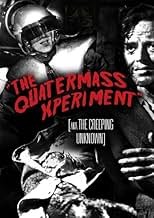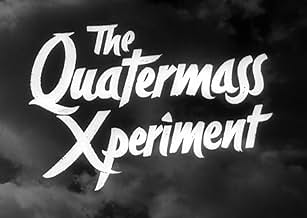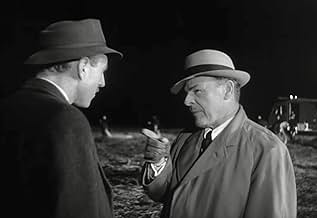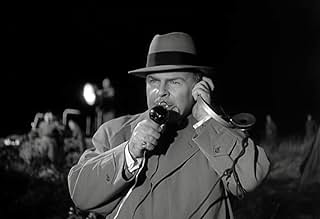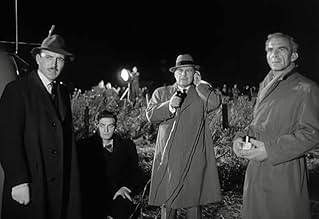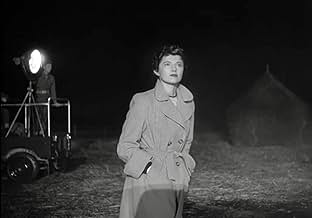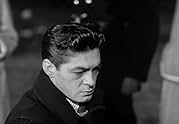AVALIAÇÃO DA IMDb
6,6/10
8 mil
SUA AVALIAÇÃO
O foguete tripulado do professor Bernard Quatermass retorna à Terra, mas dois dos astronautas estão desaparecidos e o sobrevivente parece doente e incapaz de se comunicar.O foguete tripulado do professor Bernard Quatermass retorna à Terra, mas dois dos astronautas estão desaparecidos e o sobrevivente parece doente e incapaz de se comunicar.O foguete tripulado do professor Bernard Quatermass retorna à Terra, mas dois dos astronautas estão desaparecidos e o sobrevivente parece doente e incapaz de se comunicar.
- Direção
- Roteiristas
- Artistas
Jane Aird
- Mrs. Lomax
- (não creditado)
Margaret Anderson
- Maggie
- (não creditado)
Jane Asher
- Little Girl
- (não creditado)
Harry Brunning
- Night Porter
- (não creditado)
Ken Buckle
- Police Driver
- (não creditado)
Eric Corrie
- Maggie's Boyfriend
- (não creditado)
Edward Dane
- Station Policeman
- (não creditado)
Gron Davies
- Charles Green
- (não creditado)
- Direção
- Roteiristas
- Elenco e equipe completos
- Produção, bilheteria e muito mais no IMDbPro
Avaliações em destaque
Unfortunately Nigel Kneal had absolutely no input into the film version of THE QUATERMASS EXPERIMENT . Out goes the philosophy and long discussions of the human condition and in comes the more formuliac and streamlined plotting of a hostile alien endangering the human race , but to be fair to Richard Landau he also jettisoned many underdeveloped subplots from the serial ( When episode one of TQE was broadcast on television Kneale was still writing episode 5 so some subplots were abandoned by Kneale in order to meet the deadline ) and - unlike film viewers in 2002 - the oft used premise of an alien entity coming back to Earth from a spaceship would still be very new to cinema audiences in the mid 50s. I might even be right in saying this is the first time this idea had appeared in cinema .
Director Val Guest treats THE QUATERMASS EXPERIMENT as SF film noir and brings in a heavy dose of mood and atmosphere especially during the night time zoo sequence. Unlike QUATERMASS 2 there`s no feeling that the night scenes were achieved by sticking a dark filter over the camera . Guest is less successful with his cast . Donlevy is relatively good at playing double crossing mobsters in the likes of THE BIG COMBO but he`s utterly unconvincing as a rocket scientist and it doesn`t help that he keeps pronouncing his name as " Qittermiss ", Margia Dean is utterly appalling as Judith Carroon , but Richard Wordsworth is outstanding as Victor Carroon even if he doesn`t have a single line of dialogue.
The BBC serial of THE QUATERMASS EXPERIMENT shocked the viewers of Britain when it was broadcast and in its own way the film version is almost as groundbreaking , it was a big hit at the UK box office which led to Hammer Films to concentrate solely on horror films something they would excell at for the next 10-15 years .
Trivia point 1 - The montage scenes of soldiers searching for Carroon at night time are actually culled from another British SF flick - SEVEN DAYS TO NOON
Trivia point 2- The last four episodes of the BBC serial were shown live on television but because of an industrial dispute they weren`t - unlike the first two episodes - recorded onto film which means no one will ever see the complete BBC QUATERMASS EXPERIMENT
Director Val Guest treats THE QUATERMASS EXPERIMENT as SF film noir and brings in a heavy dose of mood and atmosphere especially during the night time zoo sequence. Unlike QUATERMASS 2 there`s no feeling that the night scenes were achieved by sticking a dark filter over the camera . Guest is less successful with his cast . Donlevy is relatively good at playing double crossing mobsters in the likes of THE BIG COMBO but he`s utterly unconvincing as a rocket scientist and it doesn`t help that he keeps pronouncing his name as " Qittermiss ", Margia Dean is utterly appalling as Judith Carroon , but Richard Wordsworth is outstanding as Victor Carroon even if he doesn`t have a single line of dialogue.
The BBC serial of THE QUATERMASS EXPERIMENT shocked the viewers of Britain when it was broadcast and in its own way the film version is almost as groundbreaking , it was a big hit at the UK box office which led to Hammer Films to concentrate solely on horror films something they would excell at for the next 10-15 years .
Trivia point 1 - The montage scenes of soldiers searching for Carroon at night time are actually culled from another British SF flick - SEVEN DAYS TO NOON
Trivia point 2- The last four episodes of the BBC serial were shown live on television but because of an industrial dispute they weren`t - unlike the first two episodes - recorded onto film which means no one will ever see the complete BBC QUATERMASS EXPERIMENT
Horror/science fiction films have rarely been singled out for the quality of the acting in them. Over the decades, a couple of "monsters" have been tapped for praise: Fredric March won an Oscar for his turn at Jekyll and Hyde, & Jeff Goldblum was rightly seen as an example of "inspired casting" in David Cronenberg's remake of _The Fly_.
But I think Richard Wordsworth has them both beat.
I enjoy _The Creeping Unknown_ overall, but it is Wordsworth's performance as Victor Caroon that lifts it into the stratosphere for me. I mean, sheesh, _look_ at him! This is an incredibly painful and, yes, passionate portrait of a man whose _body_ is being taken over and is changing into something else, even as he fights to retain possession of it. What might such a battle _feel_ like? Wordsworth lets you know, and in doing so anchors an almost cliché science-fiction "what if ...?" in raw human nerve endings. Watch him battle the frightening desires that overcome him; watch him try to stay ... human. He's first class, and why his career never really took off ...
I am probably all alone on a windswept plain in this, but I think Wordsworth's acting here is as frenzied and solid as that of Klaus Kinski in any of the great movies he did with Werner Herzog. So shoot me! :)
But I think Richard Wordsworth has them both beat.
I enjoy _The Creeping Unknown_ overall, but it is Wordsworth's performance as Victor Caroon that lifts it into the stratosphere for me. I mean, sheesh, _look_ at him! This is an incredibly painful and, yes, passionate portrait of a man whose _body_ is being taken over and is changing into something else, even as he fights to retain possession of it. What might such a battle _feel_ like? Wordsworth lets you know, and in doing so anchors an almost cliché science-fiction "what if ...?" in raw human nerve endings. Watch him battle the frightening desires that overcome him; watch him try to stay ... human. He's first class, and why his career never really took off ...
I am probably all alone on a windswept plain in this, but I think Wordsworth's acting here is as frenzied and solid as that of Klaus Kinski in any of the great movies he did with Werner Herzog. So shoot me! :)
Before a little British company called Hammer became famous for Dracula and Frankenstein, there were the adventures of Professor Bernard Quatermass. Based on the live BBC serial from 1953, The Quatermass Xperiment put Hammer on the film world map. How that happened it obvious from this tense, realistic, and gritty science fiction classic.
The film is immensely helped by an excellent cast. Brian Donlevy's Quatermass is the archetype science fiction film scientist: a scientist obsessed with their quest for science before turning having to deal with the consequences of that quest. Donlevy plays Quatermass to perfection as a scientist who is both horrified and fascinated by the events he has set in motion. It's a strong performance filled with realism. fascination and horror. The cast also includes terrific performances from Jack Warner as Scotland Yard's Inspector Lomax, Margia Dean who takes the potentially clichéd Judith Carroon and puts flesh and blood on the character, and David King-Wood as Quatermass's fellow scientist Doctor Briscoe. The best performance of the film may well be from the character who never speaks: Richard Wordsworth as Victor Carroon. Wordsworth perfectly plays both the horror of the lone surviving astronaut and also sympathy as the worst off victim of the Quatermass experiment. This is especially true in a scene where Caroon finds himself at a dock where a little girl approaches him with her doll. It reminds one of the scene from the Universal Frankensein where the seemingly innocent takes on a darker meaning. Overall, the film has a terrific cast of actors bringing it to life.
At a time when science fiction films were defined by the clichéd and outrageous monster and alien invasion films, this film (and its TV counterpart) went in the exact opposite direction. Director Val Guest choose to do the film not in the style of the time but in a near documentary style. That's why the film work's fifty years later: it seems real in that it is a product of its time are place. If Britian had started the space race in the mid-1950's, one feels this is how it would have been.
The film is also helped by two very strong elements: the black and white cinematography and the music score. Doing the film in black and white adds atmosphere to a film that is part alien invasion and part manhunt. It helps especially in the film's fiery finale. The music score by James Bernard is terrific in adding to the atmosphere of the film and it never intrudes, but just helps to bring one a little bit closer to the edge of one's seat. The film wouldn't be the same without either one of these two elements.
Yet as much as I would like to call this film perfect, it isn't. There is one thing that the film hits and misses on: special effects. The downside of the film being so much a product of its time is that when the special effects are looked back at from a distance, they look primitive. That's not to say that the special effects are bad. The prosthetics work in particular looks good even by today's standards as far as I'm concerned. The finale of the film is the most obvious spot where the special effects are a bit of a let down by modern standards. Then again, it is hard to compare special effects from one era to another so this is an issue for the viewer to decide on.
While the special effects may hamper the film for some, one must admit that The Quatermass Xperiment is a classic of the genre. From the terrific performance (espeically of Donlevy and Wordsworth), to the realistic style and tone, to the excellent cinematography, to the dark score by Jame Bernard, The Quatermass Xperiment is a tour de force for the more intelligent and less action based science fiction films. If you can put aside the mid-1950's special effects, you're going to find a tense, realistic, and gritty science fiction classic.
The film is immensely helped by an excellent cast. Brian Donlevy's Quatermass is the archetype science fiction film scientist: a scientist obsessed with their quest for science before turning having to deal with the consequences of that quest. Donlevy plays Quatermass to perfection as a scientist who is both horrified and fascinated by the events he has set in motion. It's a strong performance filled with realism. fascination and horror. The cast also includes terrific performances from Jack Warner as Scotland Yard's Inspector Lomax, Margia Dean who takes the potentially clichéd Judith Carroon and puts flesh and blood on the character, and David King-Wood as Quatermass's fellow scientist Doctor Briscoe. The best performance of the film may well be from the character who never speaks: Richard Wordsworth as Victor Carroon. Wordsworth perfectly plays both the horror of the lone surviving astronaut and also sympathy as the worst off victim of the Quatermass experiment. This is especially true in a scene where Caroon finds himself at a dock where a little girl approaches him with her doll. It reminds one of the scene from the Universal Frankensein where the seemingly innocent takes on a darker meaning. Overall, the film has a terrific cast of actors bringing it to life.
At a time when science fiction films were defined by the clichéd and outrageous monster and alien invasion films, this film (and its TV counterpart) went in the exact opposite direction. Director Val Guest choose to do the film not in the style of the time but in a near documentary style. That's why the film work's fifty years later: it seems real in that it is a product of its time are place. If Britian had started the space race in the mid-1950's, one feels this is how it would have been.
The film is also helped by two very strong elements: the black and white cinematography and the music score. Doing the film in black and white adds atmosphere to a film that is part alien invasion and part manhunt. It helps especially in the film's fiery finale. The music score by James Bernard is terrific in adding to the atmosphere of the film and it never intrudes, but just helps to bring one a little bit closer to the edge of one's seat. The film wouldn't be the same without either one of these two elements.
Yet as much as I would like to call this film perfect, it isn't. There is one thing that the film hits and misses on: special effects. The downside of the film being so much a product of its time is that when the special effects are looked back at from a distance, they look primitive. That's not to say that the special effects are bad. The prosthetics work in particular looks good even by today's standards as far as I'm concerned. The finale of the film is the most obvious spot where the special effects are a bit of a let down by modern standards. Then again, it is hard to compare special effects from one era to another so this is an issue for the viewer to decide on.
While the special effects may hamper the film for some, one must admit that The Quatermass Xperiment is a classic of the genre. From the terrific performance (espeically of Donlevy and Wordsworth), to the realistic style and tone, to the excellent cinematography, to the dark score by Jame Bernard, The Quatermass Xperiment is a tour de force for the more intelligent and less action based science fiction films. If you can put aside the mid-1950's special effects, you're going to find a tense, realistic, and gritty science fiction classic.
POSSIBLE SPOILERS Government scientist Professor Bernard Quatermass (BRIAN DONLEVY) sends a rocket into space containing three astronauts. Radio contact is lost and later it crash lands in the English countryside. Two of the crew members are missing, but the survivor, Victor Carroon (RICHARD WORDSWORTH) is slowly being taken over by an alien fungus that feeds on the blood of animals and human-beings.
In a bid to win audiences away from their TV sets (something that was a real threat to cinemas at the time), Hammer elected to film the popular BBC serial THE QUATERMASS EXPERIMENT (the E was replaced with X in order to emphasise it's X certificate), which was the creation of writer Nigel Kneale. The gamble payed off and Hammer had a box office hit on their hands in 1955.
Seen today, THE QUATERMASS XPERIMENT is obviously very tame in comparison to modern day sci-fi and horror films, most of it's shock sequences occur off screen with the camera cutting away and harping back on reaction shots. Yet it is a milestone in the development of British horror cinema and along with the company's THE CURSE OF FRANKENSTEIN, it spawned this country's horror boom of the 1950's and 60's. Richard Wordsworth's Carroon is one of the most sympathetic monsters in British horror and there is a classic scene at the London docks where the former is hiding out in an abandoned boat and is awakened by a little girl who is having a pretend picnic with her dolly. Unaware of the true horror that's going on, the little girl naively asks Carroon if he wants to join them. One can see that Carroon is fully aware of what would happen if the girl touches him and runs away accidentally breaking her dolly.
Wordsworth is brilliant as Carroon and so is Brian Donlevy as Quatermass while director Val Guest's documentary approach gives the picture a sense of conviction.
In a bid to win audiences away from their TV sets (something that was a real threat to cinemas at the time), Hammer elected to film the popular BBC serial THE QUATERMASS EXPERIMENT (the E was replaced with X in order to emphasise it's X certificate), which was the creation of writer Nigel Kneale. The gamble payed off and Hammer had a box office hit on their hands in 1955.
Seen today, THE QUATERMASS XPERIMENT is obviously very tame in comparison to modern day sci-fi and horror films, most of it's shock sequences occur off screen with the camera cutting away and harping back on reaction shots. Yet it is a milestone in the development of British horror cinema and along with the company's THE CURSE OF FRANKENSTEIN, it spawned this country's horror boom of the 1950's and 60's. Richard Wordsworth's Carroon is one of the most sympathetic monsters in British horror and there is a classic scene at the London docks where the former is hiding out in an abandoned boat and is awakened by a little girl who is having a pretend picnic with her dolly. Unaware of the true horror that's going on, the little girl naively asks Carroon if he wants to join them. One can see that Carroon is fully aware of what would happen if the girl touches him and runs away accidentally breaking her dolly.
Wordsworth is brilliant as Carroon and so is Brian Donlevy as Quatermass while director Val Guest's documentary approach gives the picture a sense of conviction.
In the countryside of London, a rocket crashes on a farm and Professor Bernard Quatermass (Brian Donlevy) and Scotland Yard Inspector Lomax (Jack Warner) arrive in the spot. The rocket was launched by Prof. Quatermass with the astronauts Victor Carroon (Richard Wordsworth), Greene and Reichebheim; however only Carroon is found very sick in the cabin. He is transported to a private clinic to stay under observation despite the protests of his wife Mrs. Judith Carroon (Margia Dean). She bribes a nurse to bring Carroon to her and she finds that he is transforming into a monster. Carroon escapes killing people and animals during his metamorphosis while the Scotland Yard is hunting him down and Dr. Quatermass discovers that his process is an alien invasion.
"The Quatermass Xperiment" is an early sci-fi from Hammer with a creepy alien invasion. Despite the low-budget, the screenplay is very well written and the film entertains, specially fans of sci-fi from the 50's. My vote is six.
Title (Brazil): "Terror que Mata" ("Terror that Kills")
Note: On 12 Dec 2019, I saw this film again.
"The Quatermass Xperiment" is an early sci-fi from Hammer with a creepy alien invasion. Despite the low-budget, the screenplay is very well written and the film entertains, specially fans of sci-fi from the 50's. My vote is six.
Title (Brazil): "Terror que Mata" ("Terror that Kills")
Note: On 12 Dec 2019, I saw this film again.
Você sabia?
- CuriosidadesThe film achieved notoriety Stateside when in 1956 the parents of Stewart Cohen attempted to sue Chicago's Lake Theater and distributors United Artists for negligence after their nine-year-old son died of a ruptured artery at a double-bill of this and A Torre dos Monstros (1956) on Sunday 28th October, during the opening sequence of the Hammer movie. Cohen entered the Guinness Book of Records as the only known case of someone literally dying of fright at a horror film (he had been unknowingly living with an undiagnosed heart condition): pathologist Dr Albert Baugher officially found that "The boy died of a heart collapse after extraordinary tension while watching a film."
- Erros de gravaçãoVolkswagen Bus en route to the crash site is not the same Volkswagen Bus that arrives through the gate at the crash site. VW badge is larger, chrome trim is missing and license plate is different.
- Citações
Prof. Bernard Quatermass: There's no room for personal feelings in science, Judith!
- Versões alternativasThe original 1955 "Quatermass Xperiment" print has the closing caption "The End"; the reissued version (with a still bearing the new title "The Quatermass Experiment" inserted into the opening credits) replaces this with "A Hammer Production Produced at Bray Studios".
- ConexõesFeatured in Frances Farmer Presents: The Creeping Unknown (1959)
Principais escolhas
Faça login para avaliar e ver a lista de recomendações personalizadas
- How long is The Quatermass Xperiment?Fornecido pela Alexa
Detalhes
- Data de lançamento
- País de origem
- Idioma
- Também conhecido como
- Projeto Quatermass
- Locações de filme
- East India Docks, London, Greater London, Inglaterra, Reino Unido(derelict boat scene with little girl)
- Empresa de produção
- Consulte mais créditos da empresa na IMDbPro
Bilheteria
- Orçamento
- £ 45.000 (estimativa)
- Tempo de duração
- 1 h 22 min(82 min)
- Cor
- Mixagem de som
- Proporção
- 1.37 : 1(original/negative aspect ratio, alternative theatrical ratio)
Contribua para esta página
Sugerir uma alteração ou adicionar conteúdo ausente


